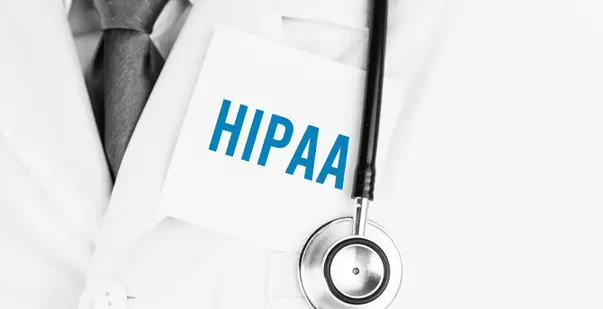What Does HIPAA Stand For?

August 5, 2024
With so much of our information stored online these days, protecting health data has become a serious concern. And it’s not just paranoia—between 2005 and 2019, data breaches affected more than 249 million people in the U.S. alone.
More recently, in 2023, healthcare data breaches hit an all-time high, with over 133 million records exposed—a 156% increase from the previous year, making it the worst year on record for healthcare privacy.
That’s where HIPAA comes in.
HIPAA stands for the Health Insurance Portability and Accountability Act. It’s a federal law that was signed in 1996. The main idea behind it? To keep private health information safe and out of the wrong hands.
In this post, we’ll break down what HIPAA really covers, look at the parts that make it work, and talk about why it still matters—whether you’re running a clinic or just want to understand how your health data is protected.
What Are the Main Components of HIPAA?
HIPAA encompasses a collection of standards designed to protect patient information and improve how healthcare operates. Each part of HIPAA covers a different area, from privacy and security to transactions and enforcement.
If you work in healthcare—or handle patient data in any way—understanding these parts is key to staying on the right side of HIPAA compliance.
Here’s a breakdown of the core components:
Privacy Rule
This rule sets the national standard for how Protected Health Information (PHI) should be used and shared. It applies to healthcare providers, insurance plans, and any organization that deals with patient data electronically. The goal is to protect privacy without slowing down care.
Security Rule
The Security Rule focuses specifically on electronic Protected Health Information (ePHI). It lays out technical, physical, and administrative safeguards to keep that data safe—whether it’s stored, sent, or accessed. Think firewalls, access controls, and encryption.
Transactions and Code Sets Rule
This rule pushes all healthcare entities to use standardized codes and formats when handling data like billing, insurance claims, or eligibility checks. It helps streamline operations and reduce costly errors across the healthcare system.
Unique Identifiers Rule
To keep everything consistent, HIPAA requires organizations to use specific ID numbers during transactions. That includes things like the National Provider Identifier (NPI) and the Employer Identification Number (EIN). These IDs reduce confusion and make records easier to manage.
Enforcement Rule
If an organization breaks HIPAA rules, this part kicks in. It gives the Department of Health and Human Services (HHS) the power to investigate violations and issue penalties. Fines can range from a few hundred to millions of dollars, depending on the severity.
Omnibus Rule
Added in 2013, the Omnibus Rule expanded HIPAA’s reach. It brought in updates from the HITECH Act, boosting privacy rights and holding business associates (like third-party vendors) to the same standards as healthcare providers. Patients also gained more control over their own data.
Why HIPAA Still Matters
The Health Insurance Portability and Accountability Act (HIPAA) plays a vital role in keeping healthcare data safe. It’s not just about ticking off a legal box—it’s about building trust, improving care, and ensuring Protected Health Information (PHI) stays private.
Here’s why HIPAA remains essential in today’s healthcare system:
- It Protects Patient Privacy
HIPAA sets national standards that make sure personal health data is only accessed or shared by people who are authorized. Whether it’s a doctor, nurse, or insurance rep, everyone must follow the same rules to protect sensitive information. - It Strengthens Data Security
HIPAA compliance requires healthcare providers to put real safeguards in place—things like secure systems, encrypted records, and controlled access. These technical and administrative protections help prevent unauthorized use of electronic Protected Health Information (ePHI). - It Builds Trust Between Patients and Providers
When patients know their information is safe, they’re more likely to open up to their care team. That trust makes it easier to share details, follow up on treatment, and build stronger patient-provider relationships. - It Reduces Red Tape
By standardizing how data is shared and coded, HIPAA helps healthcare organizations avoid paperwork overload. This means less confusion and more time for actual patient care. - It Helps Prevent Fraud and Misuse
HIPAA rules are designed to stop fraud and abuse in the system. By making organizations accountable for how they handle data, the law helps ensure healthcare resources are used properly. - It Gives Patients More Control
Under HIPAA, people have the right to view their medical records, request copies, and ask for corrections. That kind of access puts patients in the driver’s seat when it comes to managing their own health information. - It Holds Providers Accountable
Through the Enforcement Rule, HIPAA makes sure organizations take responsibility for keeping data safe. Violations can lead to serious fines and damage to reputation—which is why regular HIPAA training is so important for staff. - It Supports Health Tech Innovation
HIPAA doesn’t just protect data—it also encourages smarter use of technology. As more providers move to digital records and virtual care, HIPAA offers a framework that balances security with innovation.
🔗 Read More: Who Must Comply with HIPAA Rules and Regulations?
Conclusion
So, what does HIPAA stand for—and why does it matter?
The Health Insurance Portability and Accountability Act isn’t just a list of rules. It’s a foundation for protecting sensitive healthcare data and maintaining trust between patients and providers. Whether you work in the medical field or are simply a patient navigating the system, understanding HIPAA helps you recognize your rights—and your responsibilities.
As healthcare continues to evolve, the importance of HIPAA compliance will only grow. Its protections help ensure that personal information stays private, secure, and handled with care.





